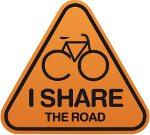Crash Course:
What to do if you get in a bicycle accident
by John Duggan
You might be on your club training ride, commuting to work or simply out riding with your friends, and when you least expect it, your worst fear becomes a reality: The minivan approaching from the opposite direction makes a left turn in front of you. You lock up your brakes and skid before crashing into the passenger side of the vehicle. You have some road rash but quickly realize you're still alive.
And then your adrenaline kicks in.
The minivan driver admits they didn't see you, immediately takes the offensive and asks why you were riding in the roadway and why you didn't stop.
The ever-increasing number of cyclists combined with the higher volume of motor vehicle traffic makes the above scenario a nearly everyday occurence in the Pacific Northwest.
Unfortunately, I've been in this situation twice, and both times I thought I wasn't hurt and could ride away. In each instance, approximately a mile down the road, I realized I was injured, my bike was damaged and I was looking for the nearest emergency room. By this time, it may be too late to gather the information you need to make a claim against the at-fault driver.
Through my personal experience on the bike as well as my experience representing injured cyclists, I have learned what you should and should not do if you find yourself the victim of a negligent driver. Keep in mind that as a cyclist, you are usually behind the eight ball.
In most bicycle/motor vehicle accident claims, I demand that the insurance company declare the bike and all damaged clothing and accessories a total loss and pay full replacement value. In most bicycle/motor vehicle accidents in Washington (Oregon may have different laws), regardless of who was at fault, the vehicle driver's insurance will pay reasonable and necessary medical bills and some wage loss.
Hopefully you will never find yourself in a situation where you will need to use this information, but if you do, now you will be prepared. Keep in mind that most bicycle/car accidents occur because the vehicle driver does not see the cyclist.
So be smart: Make yourself visible and ride safely.
-- John Duggan of Seattle is an avid cyclist and attorney who represents injured cyclists. He is a member of the Bicycle Alliance of Washington, the Cascade Bicycle Club and the Washington State Trial Lawyers Association. He is also a sponsor and member of the Byrne/Jet City Velo cycling team. He can be reached at (206) 343-1888 or johnd@warrenduggan.com
Sidebar: Bike Crash Tips
To preserve your rights, keep the following list in your saddlebag -- and remember to use it.
- Do remain calm, collected and non-confrontational.
- Do call the police and insist an officer files a police report. In the event that an officer does not respond, go to a police station and file an accident report within 72 hours of the incident.
- Do get the vehicle driver's insurance information, address, phone number and license plate number.
- Do get the name, phone number and address of every witness.
- Do get the necessary medical treatment.
- Do have your bike thoroughly inspected by a reputable bike shop.
- Do take photographs of the accident scene, your injuries, your bike and all other involved vehicles (Your new camera phone may come in handy!).
- Do not lose your temper or argue with the vehicle driver.
- Do not minimize your injuries or your bike damage.
- Do not give a statement to the vehicle driver's insurance company without first consulting an attorney.
- Do not rush into any settlement until you know the full extent of your injuries and bike damage.








6 comments:
These are good tips. The last time I got hit, I thought I was fine, until the adrenaline wore off and I realized I had cracked a rib. I was just riding to a friend's house who was sick to give them some food.
Be safe out there!
Great tips. I would be one of those people who rode away with my arm dangling out of its socket. Adrenaline can be an amazing thing. Luckily, this has never happened to me.
It's good to remember that he who loses his temper first generally loses it in the eyes of the law. I think I might try the professional soccer player trick of laying on the ground and clutching some part of my body just to stop everything. Getting up too fast just causes the witnesses to drive away.
Happy cycling
This prompted me to post a blog on defensive riding in the hope that others can learn from my mishap and avoid this type of accident.
I have unfortunately been involved in several bike accidents. In all cases I failed to do one or more of the suggested items - and regretted it afterwards.
The adrenaline effect is very real. Sometimes the pain won't kick in until hours later, so don't assume you are ok.
I had a fork failure resulting in a crash that detached a ligament in one hand and a broken collarbone on my other side. I remember someone asking me if I was OK and I said yes, got up and walked away with my unridable bike - failing to get her name as a witness, and only realizing that I needed to go to the emergency room an hour later.
Thanks for listing down these lovely tips. I'm a cyclist myself and I use the bicycle as mush as I could to safe on fuel costs and be able to work out a sweat. But I guess with today's negligent drivers, cyclists need to take extra precautions.
Post a Comment